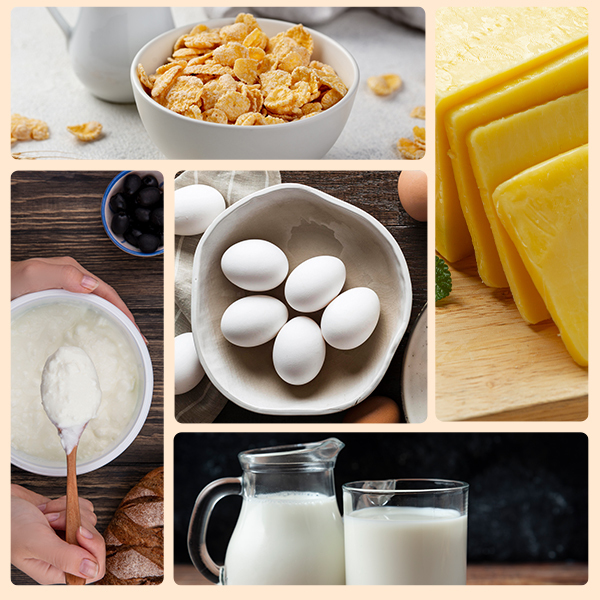Vitamin B12 Rich Foods for Vegetarian Adults Over 45
Blogs16 Jun 2025
IN THIS ARTICLE
Vitamin B12, also known as Cobalamin is a water-soluble vitamin that is naturally found in some foods and is also available as a supplement. This vitamin contains Cobalt compounds and is crucial for the functioning and maintenance of the central nervous system, the formation of healthy red blood cells, and DNA synthesis.
Why Do Adults Face a Vitamin B12 Deficiency?
Older adults are more likely to face a vitamin B12 deficiency if they suffer from atrophic gastritis, pernicious anaemia, chronic condition which causes inflammaweighttion in the stomach, and other conditions which can decrease the secretion of hydrochloric acid in the stomach, in turn decreasing Vitamin B12 absorption in the body. Helicobacter pylori infection is another condition in older adults that is linked to Vitamin B12 deficiency as these bacteria, Helicobacter pylori, causes inflammation that reduces the absorption of this vitamin.
Adults who have had gastrointestinal surgery or who are suffering from gastrointestinal issues may also be more likely to have a B12 deficiency. Meanwhile, vegans and vegetarians as a bunch may run the risk of having a B12 deficiency as most Vitamin B12 sources are animal products such as dairy and eggs. Hence those who are limited to plant-based items only might need more B12 as required for healthy functioning.
How Much Vitamin B12 Do You Need?
According to the latest Indian Council of Medical Research and National Institute of Nutrition guidelines, adults need about 2.2 micrograms of Vitamin B12 daily. Ensuring this intake can help maintain optimal health and vitality.
Vitamin B12 Foods for Vegetarians
The key to overcoming this challenge is creating a vegetarian diet for vitamin b12. You can include these vitamin b12 sources for vegetarians to do so:

1. Low-fat Milk
Low-fat milk is a source of Vitamin B12 along with other essential nutrients such as calcium and Vitamin D. Having this milk regularly may help maintain bone health, making it important to add to your diet.
2. Low-fat Yoghurt
Yoghurt, especially the low-fat variety, offers Vitamin B12. In addition, it also has probiotics, which may aid in digestion and boost gut health. Include low-fat yoghurt in your diet for its dual advantage!
3. Cheese
Yes, cheese too, when had in moderation, can be a great way to get your fill of vitamin B12. It’s also a source of protein and calcium and let’s not forget how delicious it is!
4. Eggs
If you typically add eggs to your vegetarian diet, it’s great, because you have another source of Vitamin B12 and protein! Since they are so easily available and simple to cook, you can make a variety of dishes with them too.
5. Fortified Cereal
This breakfast staple is not only easily accessible, but it can also be a substantial source of Vitamin B12 for vegetarians. Cereals fortified with B12 provide a hassle-free way of incorporating this essential nutrient into your daily regime. Plus, being a flexible food item, you can pair it with fruits or nuts to enhance nutritional value.
Tips on How to Increase your Vitamin B12 Levels
Our 3 main tips to boost your B12 levels are:
- Include a variety of B12 Vitamin foods for vegetarians in your diet to ensure wholesome and maximum nutrition
- Regular consumption of supplements can also help you fulfil your daily required intake and keep your B12 levels high
- Consult a doctor before starting any supplement regime and ask them of ways you can increase your B12 intake safely.
Conclusion
Maintaining healthy Vitamin B12 levels can help your nervous system and other important functions in the body. Since Vitamin B12 is a water-soluble vitamin, it is found in many foods naturally including dairy, eggs, tofu etc. By incorporating these foods into your diet, you can ensure sufficient intake of this essential nutrient, promoting overall well-being.
Remember, Right Shift is your companion on the path of healthy ageing, providing you with valuable information on maintaining your health. Our health-related blogs can help you increase your knowledge on interesting topics and our free health score calculator and meal plans can help you take the first few steps towards a healthier, stronger you. Let's make the shift to a healthier lifestyle together!
Other Popular Blogs
Benefits of vitamin b12 | Protein rich foods for vegetarians | Common dietary deficiencies | Healthy iron rich foods | What are micronutrients |
FAQs
Symptoms of B12 deficiency include fatigue, weakness, loss of appetite, weight loss, and having yellowish skin.
Vegetarians can ensure adequate B12 intake by consuming fortified foods, dairy products, and B12 supplements.
Yes, Vitamin B12 absorption decreases with age due to reduced secretion of hydrochloric acid in the stomach, making it harder to absorb this vitamin.
1. The key role of micronutrients, CLINICAL NUTRITION
2. What You Should Know About Water-Soluble Vitamins, Cleveland Clinic
3. Fat-Soluble Vitamins: What They Are and How To Get the Most Out of Them, Cleveland Clinic
4. Diet and Health: Implications for Reducing Chronic Disease Risk, NIH
5. A Review of Micronutrients and the Immune System–Working in Harmony to Reduce the Risk of Infection, PMC
6. Role of Antioxidant Vitamins and Other Micronutrients, MDPI
7. An Updated Comprehensive Review on Vitamin A and Carotenoids in Breast Cancer, PMC
8. High-dose intravenous vitamin C, a promising multi-targeting agent in the treatment of cancer, NIH




